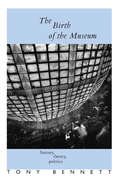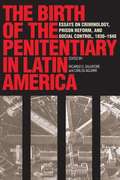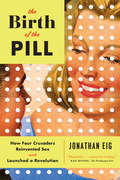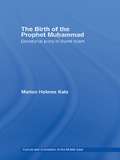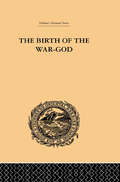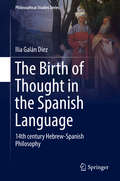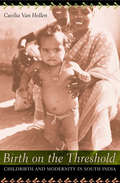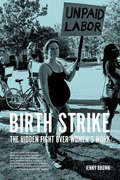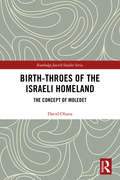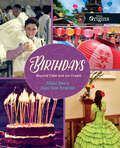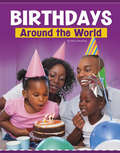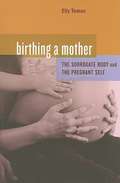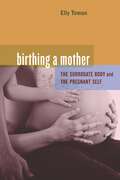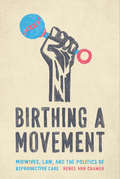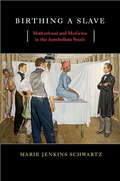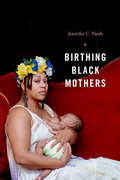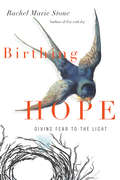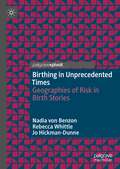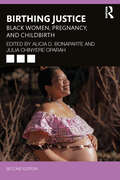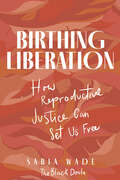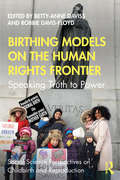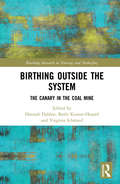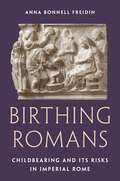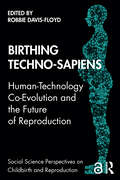- Table View
- List View
The Birth of the Museum: History, Theory, Politics (Culture: Policy and Politics)
by Tony BennettIn a series of richly detailed case studies from Britian, Australia and North America, Tony Bennett investigates how nineteenth- and twentieth-century museums, fairs and exhibitions have organized their collections, and their visitors. Discussing the historical development of museums alongside that of the fair and the international exhibition, Bennett sheds new light upon the relationship between modern forms of official and popular culture. Using Foucaltian perspectives The Birth of the Museum explores how the public museum should be understood not just as a place of instruction, but as a reformatory of manners in which a wide range of regulated social routines and performances take place. This invigorating study enriches and challenges the understanding of the museum, and places it at the centre of modern relations between culture and government. For students of museum, cultural and sociology studies, this will be an asset to their reading list.
The Birth of the Palestinian Refugee Problem Revisited
by Benny MorrisBenny Morris' The Birth of the Palestinian Refugee Problem was published in 1988. Its startling revelations about how and why 700,000 Palestinians left their homes and became refugees during the Arab-Israeli war in 1948 undermined traditional interpretations as to whether they left voluntarily or were expelled as part of a systematic plan. This 2004 book represents a revised edition of the earlier work, compiled on the basis of newly-opened Israeli military archives. While the focus remains the 1948 war and the analysis of the Palestinian exodus, the new material contains more information about what happened in Jerusalem, Jaffa and Haifa, and how events there led to the collapse of Palestinian urban society. It also sheds light on the battles and atrocities that resulted in the disintegration of rural communities. The story is a harrowing one. The refugees now number four million and their existence remains a major obstacle to peace.
The Birth of the Penitentiary in Latin America: Essays on Criminology, Prison Reform, and Social Control, 1830-1940
by Salvatore Ricardo D. Carlos AguirreOpening a new area in Latin American studies, The Birth of the Penitentiary in Latin America showcases the most recent historical outlooks on prison reform and criminology in the Latin American context. The essays in this collection shed new light on the discourse and practice of prison reform, the interpretive shifts induced by the spread of criminological science, and the links between them and competing discourses about class, race, nation, and gender. The book shows how the seemingly clear redemptive purpose of the penitentiary project was eventually contradicted by conflicting views about imprisonment, the pervasiveness of traditional forms of repression and control, and resistance from the lower classes.
The Birth of the Pill: How Four Crusaders Reinvented Sex and Launched a Revolution
by Jonathan EigA Chicago Tribune 'Best Books of 2014' A Washington Post '50 Notable Works of Nonfiction & Best Science Books 2014' A Chicago Tribune 'Nonfiction Books to Gift 2014' A Slate 'Best Books 2014: Staff Picks' A Booklist '2014 Editor's Choice' & 'Top 10 Science and Health Books of 2014' A St. Louis Post-Dispatch 'Best Books of 2014: Nonfiction' The fascinating story of one of the most important scientific discoveries of the twentieth century. We know it simply as "the pill," yet its genesis was anything but simple. Jonathan Eig's masterful narrative revolves around four principal characters: the fiery feminist Margaret Sanger, who was a champion of birth control in her campaign for the rights of women but neglected her own children in pursuit of free love; the beautiful Katharine McCormick, who owed her fortune to her wealthy husband, the son of the founder of International Harvester and a schizophrenic; the visionary scientist Gregory Pincus, who was dismissed by Harvard in the 1930s as a result of his experimentation with in vitro fertilization but who, after he was approached by Sanger and McCormick, grew obsessed with the idea of inventing a drug that could stop ovulation; and the telegenic John Rock, a Catholic doctor from Boston who battled his own church to become an enormously effective advocate in the effort to win public approval for the drug that would be marketed by Searle as Enovid. Spanning the years from Sanger's heady Greenwich Village days in the early twentieth century to trial tests in Puerto Rico in the 1950s to the cusp of the sexual revolution in the 1960s, this is a grand story of radical feminist politics, scientific ingenuity, establishment opposition, and, ultimately, a sea change in social attitudes. Brilliantly researched and briskly written, The Birth of the Pill is gripping social, cultural, and scientific history.
The Birth of The Prophet Muhammad: Devotional Piety in Sunni Islam (Culture and Civilization in the Middle East)
by Marion Holmes KatzIn the medieval period, the birth of the Prophet Muhammad (the mawlid) was celebrated in popular narratives and ceremonies that expressed the religious agendas and aspirations of ordinary Muslims, including women. This book examines the Mawlid from its origins to the present day and provides a new insight into how an aspect of everyday Islamic piety has been transformed by modernity. The book gives a window into the religious lives of medieval Muslim women, rather than focusing on the limitations that were placed on them and shows how medieval popular Islam was coherent and meaningful, not just a set of deviations from scholarly norms. Concise in both historical and textual analysis, this book is an important contribution to our understanding of contemporary Muslim devotional practices and will be of great interest to postgraduate students and researchers of Islam, religious studies and medieval studies.
The Birth of the War-God: A Poem by Kalidasa
by Ralph T.H. GriffithThis is Volume IV of fourteen in the Oriental series on India: Language and Literature. First published in 1879 and focuses on ‘The Birth of the War-God’, a poem in seven cantos, written by Kalidasa.
The Birth of Thought in the Spanish Language: 14th century Hebrew-Spanish Philosophy (Philosophical Studies Series #127)
by Ilia Galán DíezThis book takes readers on a philosophical discovery of a forgotten treasure, one born in the 14th century but which appears to belong to the 21st. It presents a critical, up-to-date analysis of Santob de Carrión, also known as Sem Tob, a writer and thinker whose philosophy arose in the Spain of the three great cultures: Jews, Christians, and Muslims, who then coexisted in peace. The author first presents a historical and cultural introduction that provides biographical detail as well as context for a greater understand of Santob's philosophy. Next, the book offers a dialogue with the work itself, which looks at politics, sociology, anthropology, psychology, ethics, aesthetics, metaphysics, and theodicy. The aim is not to provide an exhaustive analysis, or to comment on each and every verse, but rather to deal only with the most relevant for today’s world.Readers will discover how Santob believed knowledge must be dynamic, and tolerance fundamental, fleeing from dogma, since one cannot avoid a significant dose of moral and aesthetic relativism. Subjectivity, within its own codes, must seek a profound ethics, not puritanical but which serves to escape from general ill will. Santob offers a criticism of wealth and power that does not serve the people which appears to be totally relevant today. In spite of the fame he achieved in his own time, Santob has largely remained a vestige of the past. By the end of this book, readers will come to see why this important figure deserves to be more widely studied. Indeed, not only has this medieval Spanish philosopher searched for truth in an unstable, confused world of contradictions, but he has done so in a way that can still help us today.
Birth on the Threshold
by Cecilia Van HollenEven childbirth is affected by globalization--and in India, as elsewhere, the trend is away from home births, assisted by midwives, toward hospital births with increasing reliance on new technologies. And yet, as this work of critical feminist ethnography clearly demonstrates, the global spread of biomedical models of childbirth has not brought forth one monolithic form of "modern birth." Focusing on the birth experiences of lower-class women in the South Indian state of Tamil Nadu, Birth on the Threshold reveals the complex and unique ways in which modernity emerges in local contexts. Through vivid description and animated dialogue, this book conveys the birth stories of the women of Tamil Nadu in their own voices, emphasizing their critiques of and aspirations for modern births today. In light of these stories, author Cecilia Van Hollen explores larger questions about how the structures of colonialism and postcolonial international and national development have helped to shape the form and meaning of birth for Indian women today. Ultimately, her book poses the question: How is gender--especially maternity--reconfigured as birth is transformed?
Birth Strike: The Hidden Fight over Women's Work
by Jenny BrownWhen House Speaker Paul Ryan urged U.S. women to have more children, and Ross Douthat requested "More babies, please," in a New York Times column, they openly expressed what U.S. policymakers have been discussing for decades with greater discretion. Using technical language like "age structure," "dependency ratio," and "entitlement crisis," establishment think tanks are raising the alarm: if U.S. women don't get busy having more children, we'll face an aging workforce, slack consumer demand, and a stagnant economy. Feminists generally believe that a prudish religious bloc is responsible for the protracted fight over reproductive freedom in the U.S., and that politicians only attack abortion and birth control to appeal to those "values voters." But hidden behind this conventional explanation is a dramatic fight over women's reproductive labor. On one side, elite policymakers want an expanding workforce reared with a minimum of employer spending and a maximum of unpaid women's work. On the other side, women are refusing to produce children at levels desired by economic planners. By some measures our birth rate is the lowest it has ever been. With little access to childcare, family leave, health care, and with insufficient male participation, U.S. women are conducting a spontaneous birth strike. In other countries, panic over low birth rates has led governments to underwrite childbearing and childrearing with generous universal programs, but in the U.S., women have not yet realized the potential of our bargaining position. When we do, it will lead to new strategies for winning full access to abortion and birth control, and for improving the difficult working conditions U.S. parents now face when raising children.
Birth-Throes of the Israeli Homeland: The Concept of Moledet (Routledge Jewish Studies Series)
by David OhanaThe book brings forth various perspectives on the Israeli "homeland" (moledet) from various known Israeli intellectuals such as Boaz Evron, Menachem Brinker, Jacqueline Kahanoff and more. Binding together various academic fields to deal with the question of the essence of the Israeli homeland: from the examination of the status of the Israeli homeland by such known sociologist as Michael Feige, to the historical analysis of Robert Wistrich of the place Israel occupies in history in relation to historical antisemitism. The study also examines various movements that bear significant importance on the development of the notion of the Israeli homeland in Israeli society: Such movement as "The New Hebrews" and Hebrewism are examined both historically in relation to their place in Zionist history and ideologically in comparison with other prominent movements. Drawing on the work of Jacqueline Kahanoff to provide a unique Mediterranean model for the Israeli homeland, the volume examines prominent models among the Religious Zionist sector of Israeli society regarding the relation of the biblical homeland to the actual homeland of our times. Discussing the various interpretations of the concept of the nation and its land in the discourse of Hebrew and Israeli identity, the book is a key resource for scholars interested in nationalism, philosophy, modern Jewish history and Israeli Studies.
Birthdays: Beyond Cake and Ice Cream (Orca Origins #3)
by Nikki Tate Dani Tate-StrattonInspired by memories of fantastic family birthday parties, mother-and-daughter team Nikki Tate and Dani Tate-Stratton researched the history of birthdays in order to answer such questions as, How much does where you grow up influence the way you celebrate getting a year older? Have people always celebrated birthdays? The more they investigated, the more they realized that there's a lot more to birthdays than cake, presents, a few games and perhaps a goody bag. They discovered there are as many ways to observe birthdays as there are places in which to do it.
Birthdays Around the World (Customs Around the World)
by Mary MeinkingHappy birthday! Let's celebrate! All around the world people are turning another year older. What are some ways birthdays are celebrated in Asia? Or in South America? Discover the ways people celebrate birthdays in this engaging series that develops kids' understanding of our diverse global community and their place in it.
Birthing a Mother: The Surrogate Body and the Pregnant Self
by Elly TemanBirthing a Mother is the first ethnography to probe the intimate experience of gestational surrogate motherhood. In this book, Elly Teman shows how surrogates and intended mothers carefully negotiate their cooperative endeavor.
Birthing a Mother: The Surrogate Body and the Pregnant Self
by Elly TemanBirthing a Mother is the first ethnography to probe the intimate experience of gestational surrogate motherhood. In this beautifully written and insightful book, Elly Teman shows how surrogates and intended mothers carefully negotiate their cooperative endeavor. Drawing on anthropological fieldwork among Jewish Israeli women, interspersed with cross-cultural perspectives of surrogacy in the global context, Teman traces the processes by which surrogates relinquish any maternal claim to the baby even as intended mothers accomplish a complicated transition to motherhood. Teman’s groundbreaking analysis reveals that as surrogates psychologically and emotionally disengage from the fetus they carry, they develop a profound and lasting bond with the intended mother.
Birthing a Movement: Midwives, Law, and the Politics of Reproductive Care
by Renée Ann CramerRich, personal stories shed light on midwives at the frontier of women's reproductive rights. Midwives in the United States live and work in a complex regulatory environment that is a direct result of state and medical intervention into women's reproductive capacity. In Birthing a Movement, Renée Ann Cramer draws on over a decade of ethnographic and archival research to examine the interactions of law, politics, and activism surrounding midwifery care. Framed by gripping narratives from midwives across the country, she parses out the often-paradoxical priorities with which they must engage—seeking formal professionalization, advocating for reproductive justice, and resisting state-centered approaches. Currently, professional midwives are legal and regulated in their practice in 32 states and illegal in eight, where their practice could bring felony convictions and penalties that include imprisonment. In the remaining ten states, Certified Professional Midwives (CPMs) are unregulated, but nominally legal. By studying states where CPMs have differing legal statuses, Cramer makes the case that midwives and their clients engage in various forms of mobilization—at times simultaneous, and at times inconsistent—to facilitate access to care, autonomy in childbirth, and the articulation of women's authority in reproduction. This book brings together literatures not frequently in conversation with one another, on regulation, mobilization, health policy, and gender, offering a multifaceted view of the experiences and politics of American midwifery, and promising rich insights to a wide array of scholars, activists, healthcare professionals alike.
Birthing a Slave: Motherhood and Medicine in the Antebellum South
by Marie Jenkins SchwartzThe deprivations and cruelty of slavery have overshadowed our understanding of the institution's most human dimension: birth. We often don't realize that after the United States stopped importing slaves in 1808, births were more important than ever; slavery and the southern way of life could continue only through babies born in bondage.In the antebellum South, slaveholders' interest in slave women was matched by physicians struggling to assert their own professional authority over childbirth, and the two began to work together to increase the number of infants born in the slave quarter. In unprecedented ways, doctors tried to manage the health of enslaved women from puberty through the reproductive years, attempting to foster pregnancy, cure infertility, and resolve gynecological problems, including cancer.Black women, however, proved an unruly force, distrustful of both the slaveholders and their doctors. With their own healing traditions, emphasizing the power of roots and herbs and the critical roles of family and community, enslaved women struggled to take charge of their own health in a system that did not respect their social circumstances, customs, or values. Birthing a Slave depicts the competing approaches to reproductive health that evolved on plantations, as both black women and white men sought to enhance the health of enslaved mothers--in very different ways and for entirely different reasons.Birthing a Slave is the first book to focus exclusively on the health care of enslaved women, and it argues convincingly for the critical role of reproductive medicine in the slave system of antebellum America.
Birthing Black Mothers
by Jennifer C. NashIn Birthing Black Mothers Black feminist theorist Jennifer C. Nash examines how the figure of the “Black mother” has become a powerful political category. “Mothering while Black” has become synonymous with crisis as well as a site of cultural interest, empathy, fascination, and support. Cast as suffering and traumatized by their proximity to Black death—especially through medical racism and state-sanctioned police violence—Black mothers are often rendered as one-dimensional symbols of tragic heroism. In contrast, Nash examines Black mothers’ self-representations and public performances of motherhood—including Black doulas and breastfeeding advocates alongside celebrities such as Beyoncé, Serena Williams, and Michelle Obama—that are not rooted in loss. Through cultural critique and in-depth interviews, Nash acknowledges the complexities of Black motherhood outside its use as political currency. Throughout, Nash imagines a Black feminist project that refuses the lure of locating the precarity of Black life in women and instead invites readers to theorize, organize, and dream into being new modes of Black motherhood.
Birthing Hope: Giving Fear to the Light
by Rachel Marie StoneLibrary Journal - Best Books of 2018 "To bring anything new into the world is to open one’s self and therefore to take on risk, to contaminate oneself with the other, to be made vulnerable. This requires not just courage but many things, among them faith, hope, help, companionship, grace—in a word, love." While living in one of the world's most impoverished countries, Rachel Marie Stone unexpectedly caught a baby without wearing gloves, drenching her bare hands with HIV-positive blood. Already worried about her health and family, Stone grappled anew with realities of human suffering, global justice, and maternal health. In these reflections on the mysteries of life and death, Stone unpacks how childbirth reveals our anxieties, our physicality, our mortality. Yet birth is a profoundly hopeful act of faith, as new life is brought into a hurting world that groans for redemption. God becomes present to us as a mother who consents to the risk of love and lets us make our own way in the world, as every good mother must do.
Birthing in Unprecedented Times: Geographies of Risk in Birth Stories
by Nadia von Benzon Rebecca Whittle Jo Hickman-DunneThis book shines a light on the way in which risk – in and beyond childbirth – is highly contextual, and the way in which risk-management strategies can be understood as socially and materially constructed.
Birthing Justice: Black Women, Pregnancy, and Childbirth
by Alicia D. Bonaparte Julia Chinyere OparahThe second edition of this pathbreaking, widely taught book offers six new chapters, on breastfeeding and Black infant health; Black birthing during COVID; Black doulas rethinking birthing practices; the recent buildup of a US national movement; childbirth in Zanzibar; and expanding the global movement for sexual and reproductive well-being. Other chapters are updated throughout. Birthing Justice puts Black women’s voices at the center of the debate on what should be done to fix the broken maternal care system. It foregrounds Black women’s agency in the birth justice movement. First published in 2016, Birthing Justice is a seminal text for those interested in maternal healthcare, reproductive justice, health equity, and intersectional racial justice, especially in courses on gender studies, Black studies, public health, and training programs for midwives and OB/GYNs.
Birthing Liberation: How Reproductive Justice Can Set Us Free
by Sabia WadeBlack maternal mortality statistics have not shifted in the past thirty years. The maternal mortality rate for Black patients is four to five times higher than it is for White patients. This is just one example of racism as a health and national crisis, but it is a particularly tragic one.Birthing Liberation presents reproductive justice as the pathway to equity. The issue of reproductive justice may sound specific, but it is in fact the birthplace of liberation. Its four guiding principles—analyzing power systems, addressing intersecting oppressions, centering the most marginalized, and joining together across issues and identities—have the power to lead us to collective liberation in all facets of life. Collective liberation rests on the idea that in order for us all to have equity in this world—from the safety of birthing children to the ability to bring a baby home to a safe community to having access to resources, safety, and opportunities over the long term—we must all become liberated individuals. Sabia C. Wade is a renowned radical doula and educator inspired to create a guide for how we can all achieve liberation through trauma healing and reproductive justice.Birthing Liberation creates a path to social and systemic change, starting within the birthing world and expanding far beyond.
Birthing Models on the Human Rights Frontier: Speaking Truth to Power (Social Science Perspectives on Childbirth and Reproduction)
by Betty-Anne Daviss; Robbie Davis-FloydThis book addresses the politics of global health and social justice issues around birth, focusing on dynamic communities that have chosen to speak truth to power by reforming dysfunctional health care systems or creating new ones outside the box. The chapters present models of childbirth at extreme ends of a spectrum - from conflict zones and disaster areas of Afghanistan, Israel and Palestine, and Indonesia, to models in high risk tertiary care settings in China, Canada, Australia and Turkey. Debunking notions about best care, the volume illustrates how human rights in health care are on a collision course with global capitalism and offers a number of specific solutions to an ever-increasing problem. It will be a valuable resource for scholars and students in anthropology, sociology, health and midwifery, as well as for practitioners, policy makers and organisations focused on birth or on social activism in any arena.
Birthing Outside the System: The Canary in the Coal Mine (Routledge Research in Nursing and Midwifery)
by Dahlen Hannah Kumar-Hazard Bashi Virginia SchmiedThis book investigates why women choose ‘birth outside the system’ and makes connections between women’s right to choose where they birth and violations of human rights within maternity care systems. Choosing to birth at home can force women out of mainstream maternity care, despite research supporting the safety of this option for low-risk women attended by midwives. When homebirth is not supported as a birthplace option, women will defy mainstream medical advice, and if a midwife is not available, choose either an unregulated careprovider or birth without assistance. This book examines the circumstances and drivers behind why women nevertheless choose homebirth by bringing legal and ethical perspectives together with the latest research on high-risk homebirth (breech and twin births), freebirth, birth with unregulated careproviders and the oppression of midwives who support unorthodox choices. Stories from women who have pursued alternatives in Australia, Europe, Russia, the UK, the US, Canada, the Middle East and India are woven through the research. Insight and practical strategies are shared by doctors, midwives, lawyers, anthropologists, sociologists and psychologists on how to manage the tension between professional obligations and women’s right to bodily autonomy. This book, the first of its kind, is an important contribution to considerations of place of birth and human rights in childbirth.
Birthing Romans: Childbearing and Its Risks in Imperial Rome
by Anna Bonnell FreidinHow Romans coped with the anxieties and risks of childbirthAcross the vast expanse of the Roman Empire, anxieties about childbirth tied individuals to one another, to the highest levels of imperial politics, even to the movements of the stars. Birthing Romans sheds critical light on the diverse ways pregnancy and childbirth were understood, experienced, and managed in ancient Rome during the first three centuries of the Common Era.In this beautifully written book, Anna Bonnell Freidin asks how inhabitants of the Roman Empire—especially women and girls—understood their bodies and constructed communities of care to mitigate and make sense of the risks of pregnancy and childbirth. Drawing on medical texts, legal documents, poetry, amulets, funerary art, and more, she shows how these communities were deeply human yet never just human. Freidin demonstrates how patients and caregivers took their place alongside divine and material agencies to guard against the risks inherent to childbearing. She vividly illustrates how these efforts and vital networks offer a new window onto Romans&’ anxieties about order, hierarchy, and the individual&’s place in the empire and cosmos.Unearthing a risky world that is both familiar and not our own, Birthing Romans reveals how mistakes, misfortunes, and interventions in childbearing were seen to have far-reaching consequences, reverberating across generations and altering the course of people&’s lives, their family histories, and even the fate of an empire.
Birthing Techno-Sapiens: Human-Technology Co-Evolution and the Future of Reproduction (Social Science Perspectives on Childbirth and Reproduction)
by Robbie Davis-FloydThis ground-breaking book challenges us to re-think ourselves as techno-sapiens—a new species we are creating as we continually co-evolve ourselves with our technologies. While some of its chapters are imaginary, they are all empirically grounded in ethnography and richly theorized from diverse disciplines. The authors go far beyond a techno-optimism vs. techno-pessimism stance, stretching our thinking about birthing techno-sapiens to consider not only how our cyborgian reproductive lives are constrained and/or enabled by technology but are also about emotions and spirit. The world of reproductive health care and particularly that of genetic engineering is developing exponentially, and current challenges are vastly different from those of a decade ago. The book is provocative, intended to generate debate, ideas, and future research and to influence ethical policy and practice in human techno-reproduction. It will be of interest across the social sciences and humanities, for reproductive scholars, bioethicists, techno-scientists, and those involved in the development and delivery of maternity services.
